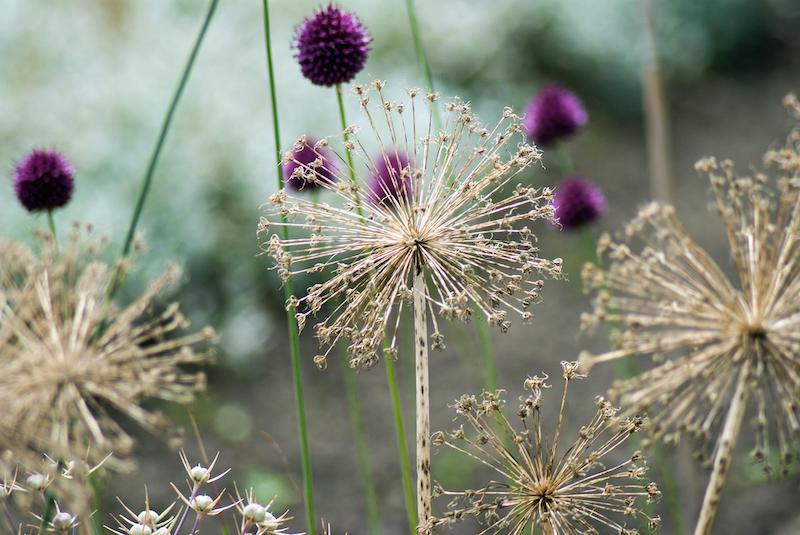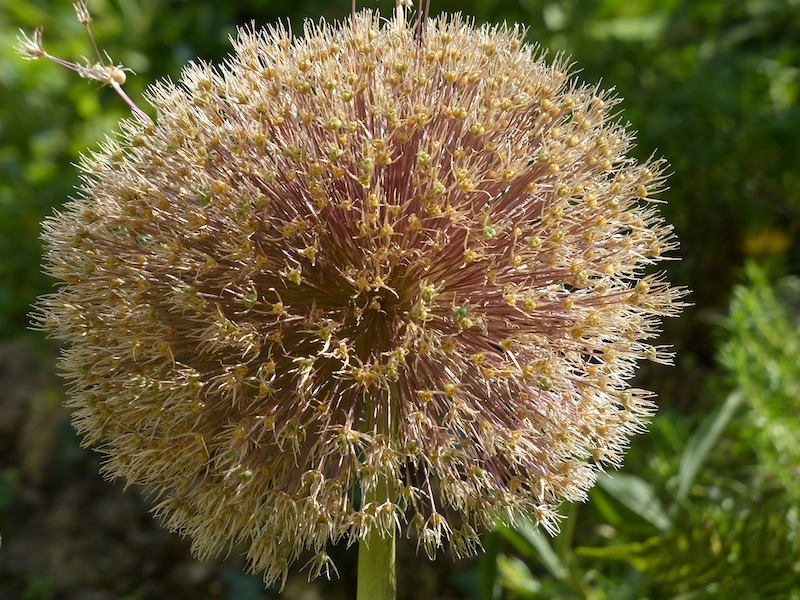Ornamental alliums are perennial bulbs that die back completely to the ground and remain dormant during the winter months. Gardeners in warmer hardiness zones may find that the strappy leaves of late-blooming alliums will remain through much of the fall into early winter if not cut back. In fact, the longer the leaves are left in place, the stronger the bulb will become for the following season. Little preparation needs to be done to help alliums survive a long winter.

Protecting Alliums in Winter
The cold hardiness rating of most ornamental allium cultivars is very good. Gardeners down to zone 3 can successfully grow most varieties with confidence that they will come back every year. Waterlogged soil and shallow planting are two things that are sure to kill alliums. Mulching with an organic material will help to insulate alliums. Finely shredded bark, chopped leaves, arborist chips, or even organic compost that is not too finely sieved are all ideal mulches.
Cutting Back Alliums For Winter
Alliums need to have their leaves in place as long as possible after flowering. This will help the bulbs bulk up and store energy for the next flowering season. Only remove the leaves after they have fully died back. Any leaves remaining after the first frost in your area should be removed before they turn black and slimy. This protects the top of the bulb from possible rot.

Allium Winter Care in Pots
Potted alliums should be moved to a location that has a bit more shelter and will not receive too much rain or runoff from roofs and downspouts. Plants overwintering in pots have less insulation than plants in the ground and should be treated as if they are growing in at least one hardiness zone lower. Wrapping pots with a layer or two of burlap may be needed in zone 3. If the weather is very cold, pots can be stored in an unheated garage or root cellar until the weather warms up.
Watering Alliums in Winter
Watering alliums in the ground or in a container is not needed over winter. The bulbs will be dormant and not able to use any extra moisture in the soil efficiently. Overwatering during cold weather will rot bulbs very quickly.
Growing Alliums Indoors
Smaller types of alliums, particularly chives and garlic chives, grow quite well in a bright sunny window during the winter. Bring the plants in before the nighttime temperatures hit freezing. Shear the plants to within 2 inches of the soil and water well. New leaves will grow back quickly. As with any herb, the more it is cut and used, the bushier it will grow. Water the pots when the top 2-3 inches of soil have dried out, and make sure the drainage is good. Potted ornamental alliums will be completely dormant during the winter and need to have a period of cold to perform their best.
Steps To Care For Alliums in Winter
Ornamental Alliums in general need minimal care during the winter. They are quite hardy and will be dormant until spring. Edible alliums such as onions, garlic and leeks can be planted in the fall and overwintered in the warmer hardiness zones.
Step 1 - Leaves should be left to die back naturally. The earlier-blooming alliums may already be dormant before late fall. Late-blooming alliums should be cut back after the first frost.
Step 2 - Move pots to a protected area during winter.
Step 3 - Add an extra layer of insulation around the outside of pots in severe winters.
Step 4 - Make sure alliums in the ground or in pots do not become waterlogged at any point during the winter.
Step 5 - Mark where alliums are planted in the ground so that they are not dug up or disturbed during spring garden preparations.
 |
Author Robbin Small - Published 7-19-2022 |
